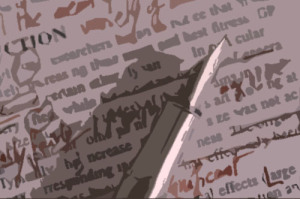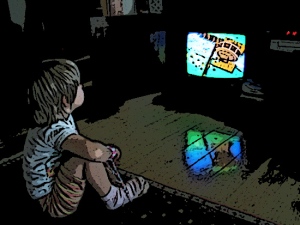Head Hopping

Has this ever happened to you?
You’re reading along, getting into the mind of a great female character, when she remarks she would make a good father some day.
Wait, you think. Wasn’t the character female?
You’ve been the victim of head-hopping. Or as I like to call it: cheating.
Head hopping is when the POV jumps from one character’s “head” to another in a scene, so you’re privy to everyone’s thoughts.
The reason I call this a cheat is because instead of your main character trying to glean what another character is doing through their actions, expressions and verbal cues, the reader is immediately inside the head of the other character who lays out all of their feelings and motivations.
Where’s the fun in that?
This is especially frustrating when the character is just a bit player. Someone who’s around for one scene and never appears again.
Yes, it’s important for the writer to know the motivations for all of their characters, even the minor ones, but that doesn’t mean it has to be told in detail, as if the reader isn’t savvy enough to understand through their words and actions, what their motivations are.
Let me give you an example:
“Hey, Dan, what’s up?”
Dan felt uncomfortable. He didn’t want to talk to Cara right now. “I’m good.”
Cara was put off by Dan’s behavior, but she decided to forge ahead anyway. “What are your weekend plans?”
Dan knew this was coming, and he didn’t want to tell her, but he’d always been honest with Cara in the past. “I Have a date.”
Cara nearly passed out. “Oh.”
Compared to:
“Hey, Dan, what’s up?”
Dan looked at the floor and shuffled his feet. “I’m good.”
“Soooo…” Cara said, as the air got ten degrees cooler, “What are your weekend plans?”
Dan looked anywhere but at her. “I have a date.”
Cara’s world shrank to a small pinhole, and she dropped into the nearest chair. “Oh.”
In the second example, did you need to get into Dan’s head to know what was up with him? Could you figure it out through him shuffling his feet and not looking at Cara, that he was uncomfortable?
I’m guessing the answer is no, especially if you’re an avid reader who pays attention to detail.
As a writer, you need to challenge yourself to use all of the senses to convey what your characters are going through and not make them “tell” the reader through their thoughts. It dulls the action.
Now, when I bring this up, I do get some people who will use an example of a classic novel written by a great author as proof it can be done.
And I’m sure in some instances, if the writer is super skilled at their craft, they can find a way to head hop with finesse.
However, unless you’ve refined your skills to that degree, my suggestion would be not to head hop at first, particularly if you find it “easier” to do and recognize it as a shortcut.
And if you do hone your skills and decide to take a stab at it, try doing it in “sections” at first that are clearly marked, so as not to confuse the reader.
So, that’s my two cents, both as a writer and an editor.
Go ahead and give me your thoughts on the subject in the comments below.
Constructive Criticism

by
The Writegirl
So, you’ve written your first novel, and you’re about to send it out into the world. You’ve constructed each word lovingly, wrapped them with tender loving care, and made sure each one flowed seamlessly into the next. Then you hand it over to your editor, convinced the only comments will be:
- Brilliant!
- Wouldn’t change a thing.
- Perfect.
- The best novel I’ve ever read.
What you actually get back is a bunch of red. Lots and lots of red, with comments like:
- Needs more conflict.
- Not sure what you’re trying to say here.
- Why is Sally all of a sudden shy?
- This scene isn’t needed.
What is your first reaction? Do you yell at the screen, “HOW DARE YOU UNDERMINE MY BRILLIANCE AND ARTISTRY!”?
Well, that’s fine. Get it out. Take a few deep breaths.Walk it off.
There. That’s better, right?
Now go back and take a look at the notes with a fresh eye.
Would more conflict make it better?
Did you write a scene knowing certain facts in your head that never made it on to the page?
Did you make Sally respond in a certain way that was plot and not character-driven?
Is that scene you love so much not needed and expressed better in the next one?
Though your novel may be quite personal, you need to look at it with a critical eye. Even if you disagree with the editor’s notes, try reworking the scene. You may realize how much better it could be. Or perhaps you wind up combining the two and give the scene more layers and the emotional wallop you’d been intending all along.
The point is to always be willing to look at your work from another angle. It could mean the difference between an agent or publisher wanting to see more or throwing it on the slush pile.
It’s My Baby!
Oh, do those words strike fear in my heart. That’s when I know the very passage in which I suggest a major rewrite, will be met with a story about how their sister’s best friend’s cousin thought that scene was awesome, and they don’t want to harm a hair on their pretty little manuscript.
Oh, no.
It’s good for a writer to fall in love with their words…to a certain extent. But when it reaches the point where they’re unwilling to change even a sentence, it becomes a problem.
I recently had this happen to me. I had to explain to the writer that it’s easy to lose perspective. That a parent needs to see the child’s faults in order to guide and nurture them. We’ve all seen what happens when a parent thinks their child is perfect and can do no wrong. They wind up selfish, entitled, and unable to see any point of view but their own. Turning a blind eye may seem noble, but in the end it causes more harm.
It’s the same for a manuscript. If a writer sees it as perfect and too precious, it winds up a self-indulgent mess that’s unable to reach the reader, because the writer was more enamored with their words than nurturing the story.
Rather than an immediate, “No!” the writer should ask, “How do you think it can be improved?”
That starts a creative discussion and always leads to a satisfactory result.
It may be that the writer strung together a lot of pretty words, but the passage doesn’t add to the plot or character development. It could be it’s bland or cliche-ridden. Or maybe the character is acting out of character for no reason. (I’ll delve more deeply into out-of-character behavior in another blog). Maybe it’s superfluous and slows down the story. Or there’s a rehashing of a situation the reader already witnessed
The point is, maintaining perspective is key. Compromise is key. The editor is there to make sure the book reflects the true talent of the writer. The editor doesn’t want to remove scenes so they’ll feel like they’re earning their paycheck.. Maybe there’s a way to make the scene even better, but when a writer is unwilling to entertain even the notion of change, they could be missing out on a way to make their book great. There’s always a reason behind the edit. All the writer has to do is ask and be open to the possibilities.
But it Happens in Real Life!
I wish I had a dollar for every time I’d come to an author about a passage that seemed out of place or over-the-top, and I heard the phrase, “But it happens in real life!”
It’s always been more difficult for me to convince a writer to change something in their story if they feel it imitates real life. For instance, some writers insist on showing their character going to the bathroom. Not just “Oh, Jane went to the bathroom. She’ll be out in a minute,” but a much more detailed account from the point of view of the person using the bathroom. When I ask why, the answer I get is, “It happens in real life! It’s a nice little detail!” and my response is this:
Many things happen in real life. A person can spend all day staring at the television or playing a video game, but nobody wants to read a story about that. A writer should ask him/herself if the scene is pertinent. Do the traits coincide with the character? Does the scene move the plot along or reveal something about the character?
Most lives aren’t as action-packed as they are in fiction. A typical conversation “in real life” would go something like this:
“Hey, how’s it going?”
“Great, how are you doing?”
“Good, thanks.”
Boring, right? But it happens in real life nearly every time two acquaintances come in contact. In fiction, we’re supposed to enter into the middle of the action. Most of our days are filled with the mundane. Nothing much happens. An actual account of the daily activities of most people would be rather boring.
I had an author who had a scene where a man was leering, in a creepy way, at a woman who’d just gotten out of the shower and had a towel wrapped around her. He had an anatomical response, and the scene included him describing…certain parts of the woman. These people were not lovers. They barely knew each other. When I told the author the scene came off more creepy than sexy, she said this kind of male response “happens in real life!” She had a husband and sons and had witnessed it many times herself!
I tried to explain that while, yes, I was sure this was true, it made the male character unlikable and creepy. He was leering in a way that didn’t fit the situation. I said it would be better if he maybe looked away or was uncomfortable. Maybe he didn’t want to have that response, so he did everything to avert his eyes. In this way, the author would be able to convey the man was attracted to the woman, without making him seem skeevy.
The sister to “But it happens in real life!” is “But I lived it!”
In other words, the fiction is based on events that happened to the author, so they write it as it happened in real life, as opposed to having the incident fit into a fictional story. When told a scene may be over the top or boring, the author takes it as if you’re saying their life is wrong.
The editor is objective. They are looking at the manuscript from the point of view, “Is this a good story?” If the author is willing to adapt the real incident to fit a good fictional story, everybody wins. Unless the book is non-fiction, situations will have to be revised. Readers need a plot. A thread they can follow. And character development.
I once edited a book where the character took one step forward and five steps back, before finally having her epiphany about ten pages before the end of the book. From there, the author packed in all the action but merely summed it up. It was like a movie where people are just plodding along, not really doing much of anything, and in the last ten minutes, one of the characters explains a lot of interesting action-packed stuff that took place off-screen.
When this was told to the author, they stated that…they lived it. This is how it happened. Nothing could move the author from her position. She was too close to the story.
Yes, writers, especially for our first novel, are told to “write what you know” but that doesn’t mean, “write abut your life, verbatim, exactly the way it happened.”
photo credit: andres.thor via photopin cc
Viewpoint (Showing, Not Telling)
We’ve all heard about “showing, not telling” when it comes to writing, but I’d like to talk about one aspect in particular. With many beginning writers, I’m struck by how they wax poetic for paragraphs on end about…a living room. They proceed to describe, in detail, the exact shade of the color of the couch, all of the furnishings, the color of the drapes, every single picture, plus what’s in the attached dining room such as the patterns on the plates, place mats, napkins, and napkin rings, and how they’re arranged on the table.
What I figure is that at some point the writer learned they needed to put some detail into their writing, but instead of concentrating on character motivations and plot, they instead go into lengthy descriptions of the hue, fabric, and length of clothing of each person in the room. Sometimes, there’s so such detail about a vacation spot, I feel it should be in a brochure. (And most likely they did nab it from a website anyway…but this isn’t about plagiarism.) There may be a reason why writers forget to fully develop their character in favor of trying to convey their deep motivation for their choice in bed linens.
Viewpoint.
When showing and not telling, the author needs to stay within a single character viewpoint. Many writers forget to let the character live and breathe. They forget the characters are independent with their own thoughts and actions. When that happens, the writer tells what that character is going through instead of showing. Have you ever read a book and been taken out of it? You’re thinking, “These are the author’s views, not the character’s.” That’s because they’re forgetting the character’s viewpoint. Real people experience things. They don’t think about them that deeply. When a person walks into a house, they have a general impression. Is the furniture shabby? Are the colors garish? Does it look like a museum or a frat house? The thoughts come in short bursts.
Sometimes the writer is even kind enough to tip their hand about a future plot point, thus ruining the element of surprise (What I didn’t know then, was this would be my last happy moment for a long time), incidents happening outside of their reality. (Meanwhile, in a corridor at the other end of the hospital…) or they know what another character is thinking ( “What Johnny didn’t know was that Jane was standing right behind him and heard everything he said.” ) Well, if we’re in Johnny’s head, and Johnny didn’t know, then JOHNNY DIDN’T KNOW. That means we can’t either, since we are, essentially, Johnny. I call that “Head Hopping” which I’ll cover in another blog.
The character must live in the moment if the writer is writing chronologically. Most real people experience events in a disjointed way. This is supposed to be the real world. It should be vivid and thoughts should come in short bursts. Keeping this in mind will stop the writer from waxing eloquent on the color of a leaf for an entire paragraph. Sure, if it’s a nature book, it will be fascinating to the reader, but if this is fiction, there’s no better way to stop the story dead in its tracks.
If the character thinks in chronological order and keeps it brief, the reader won’t have to flip back to remember what happened. For instance, one character says something, then the other character thinks about their answer for two pages before saying, “I tried.” Wait. What was Johnny responding to again?” Flip, flip, flip…
The writer can now scale down the description so that it has more impact. Leave something to the reader’s imagination! I know when I see the words “place mat” I start skimming. It’s better to make the descriptions short and interesting.
Another aspect to remember with description and viewpoint. With one manuscript I was editing, I came across a description of the main character’s room that didn’t sound one thing like the character. In this case, the description was interesting. So interesting, in fact, that I thought there must be a reason this room figured so prominently and was so unlike the character. When I asked the author, they told me there was no reason for it. That it was a room they knew and they just threw it into the story. This had me perplexed. Why not wait until they had a character who went with the room, rather than giving the room to a character it didn’t belong to? And again, the reader would think there was a reason the writer gave the character such a bizarre room. With no payoff, the reader will be left scratching their head. This is the other end of the spectrum. If the description is detailed and out-of-the-ordinary, there should be a reason behind it.
The writer also needs to remember not to use nebulous terms. Describing someone as “an old man” is subjective. What’s an old man to a ten-year-old would certainly not be the same to a thirty-year-old.
Instead, for instance, the character should note the lines on the person’s face, the stooped posture, and how they’re always reminiscing about “the good old days when people had manners and respected their elders.” And speaking of the age of the character, most teenagers wouldn’t know fine crystal from some nice glass.
Make sure the character thinks like a real person. When reading a particular passage, I’ve often thought, “Would a person really think that in their own head? Has anyone ever thought to themselves ‘the iridescent blue of my eyes stood out against my pale complexion?’ ”
I’ve had to research a lot about this stuff, both for my own benefit as a writer and as an editor. As a writer, I try to keep these tidbits in mind, so my writing has impact and doesn’t drag. As an editor, if I can give the writer a good, logical reason as to why they need to cut out the page describing the exact shade of blue of the vase, we might both be satisfied.













